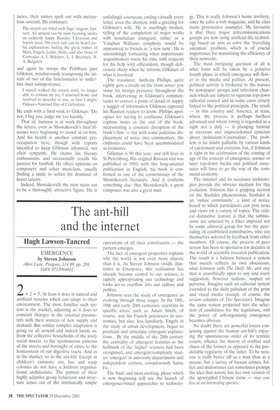The ant-hill and the internet
Hugh Lawson-Tancred
EMERGENCE by Steven Johnson Allen Lane, Penguin, £14.99, pp. 288, ISBN 0713994002 2+ 2 = 5. At least it does in natural and artificial systems which can adapt to their environment. The most familiar such system is the market, adjusting as it does to constant changes in the external parameters with their sources of new supply and demand. But similar complex adaptation is going on all around and indeed inside us, from the collective households of the lowly social insects, to the spontaneous patterns of the streets and boroughs of cities, to the homeostasis of our digestive tracts. And as in the market, so in the ant-hill. Except in children's cartoons, ant, bee and wasp colonies do not have a Stalinist organisational architecture, The pattern of their highly adaptive group behaviour and structure arises out of the intrinsically simple
operations of all their constituents — the pattern emerges.
The fact of emergent properties explains why the world is not even more chaotic than it is. As Steven Johnson vividly illustrates in Emergence, this realisation has already become central to our science, is rapidly appropriating our technology and looks set to overflow into our culture and politics.
Johnson sees the study of emergence as evolving through three stages. In the 18th, 19th and early 20th centuries, scientists in specific areas, such as Adam Smith, of course, and his French precursors in economics, but also, less familiarly. Engels in the study of urban development, began to proclaim and articulate emergent explanations. By the middle of the 20th century the centrality of emergent features as the hallmark of the 'higher' sciences had been recognised, and emergent/complexity studies 'emerged' in university departments and independent centres, conspicuously Santa Fe.
The final, and most exciting, phase which is now beginning will see the launch of emergence-based approaches to technolo
gy. This is really Johnson's home territory, since he edits a web magazine, and he cites many provocative examples. My favourite is that three major telecommunications groups are now using artificial-life technology based on ants to solve the 'travelling salesman' problem, which is of crucial importance for maximising the efficiency of their networks.
The most intriguing question of all is what form will be taken by a putative fourth phase in which emergence will flower in the media and politics. At present, political activity is brokered to the masses by newspaper groups and television channels which are subject to rigorous top-down editorial control and in some cases closely linked to the political principals. The result — in this country and America, at least, where the process is perhaps furthest advanced and where voting is regarded as a right not a duty — is plunging turnout at elections and unprecedented cynicism about `politicians'n'journalists'. The problem is no doubt palliable by various kinds of cajolement and coercion, but, if Johnson is right in his celebration of the coming of age of the concept of emergence, sooner or later top-down media and political structures will have to go the way of the command economy.
The internet and its successor technologies provide the obvious medium for this evolution, Johnson has a gripping section on the Slashdot phenomenon. Slashdot is an 'online community', a kind of notice board to which participants can post news and views on a variety of topics. The critical distinctive feature is that the submissions are selected by a filter imposed not by some editorial group for but the peerrating of established contributors, who are themselves selected by feedback from other members, Of course, the process of peer review has been in operation for decades in the world of scientific research publication. The result is a balance between a system that merely reflects its own obsessions, what Johnson calls The Daily Me, and one that is anarchically open to any and every suggestion, however tedious, suspect or perverse. Imagine such an editorial system extended to the daily pabulum of the print and visual media (except, of course, the review columns of The Spectator). Imagine the same system projected into the selection of candidates for the legislature, and the power of self-organising emergence becomes obvious.
No doubt there are powerful forces conspiring against the human ant-hill's enjoying the spontaneous order of its termite cousin, whence the history of conflict and chaos of the former as opposed to the predictable regularity of the latter, To be sure, one is really better off as a man than as a mouse, but a survey of human crimes, follies and misfortunes can sometimes prompt the idea that nature has her own version of the apocryphal Chinese curse — may you live in an interesting species.


























































 Previous page
Previous page